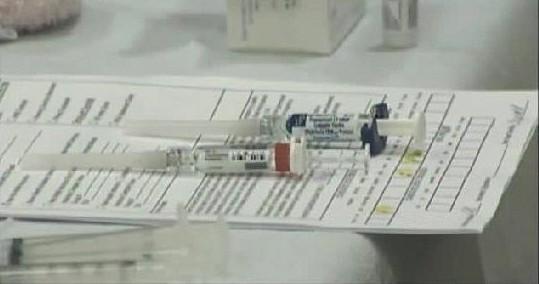
New Jersey has its first confirmed case of measles this year, health officials announced Friday night, sparking even greater fears of a widespread outbreak. The news comes only days after a Chicago-area daycare confirmed that five infants had come down with the disease, with well over 100 cases reported nationwide in just the last month.
The New Jersey Department of Health, working with the U.S. Centers for Disease Control and Prevention, said an infant in Jersey City did have measles, as suspected. The infant had not yet been vaccinated, health officials said. CDC guidelines recommend the first measles vaccine be given between the ages of 12 and 15 months.
At this time, health officials have not yet linked the infant’s case to the nationwide measles outbreak centered around Disneyland in California, but epidemiological investigations are ongoing.
Residents of the building in which the infant’s family lives have been notified of a potential measles exposure, the department said. No secondary cases have been identified thus far, health officials said, but people who have been near the infant could be at risk.
Meanwhile, health authorities in Illinois say they are expecting more cases in the area after five infants were diagnosed with measles at a daycare in Palatine, just outside of Chicago. With the new case confirmed in New Jersey, measles is now active in at least fifteen states plus Washington, DC.
The measles virus — the “most deadly of all childhood rash/fever illnesses”, according to the CDC — was classified as eliminated in the United States in 2000, though the virus has found its way back to the U.S. on occasion by international travelers, who then infect communities with low rates of vaccination.
Measles spreads when people breathe in or have contact with virus-infected fluid, such as the droplets sprayed into the air when someone with measles sneezes or coughs. A person who is exposed to the virus might not show symptoms until 8-10 days later. People with measles are contagious and can spread the disease for up to a week before the first symptoms appear, the CDC says.
Although the vaccine is approximately 99 percent effective against measles, a recent anti-vaccination movement in the US has falsely linked autism to the vaccines. Those claims have been thoroughly discredited in at least 107 independent scientific studies, which have found no evidence that the measles-mumps-rubella (MMR) vaccine is associated with autism or any other developmental disorders.
Nevertheless, the anti-vaccine movement has resulted in a drop in childhood immunization rates that was directly linked to the record number of measles cases in 2014. Last year, 644 cases were confirmed, accounting for a nearly two-decade high.
